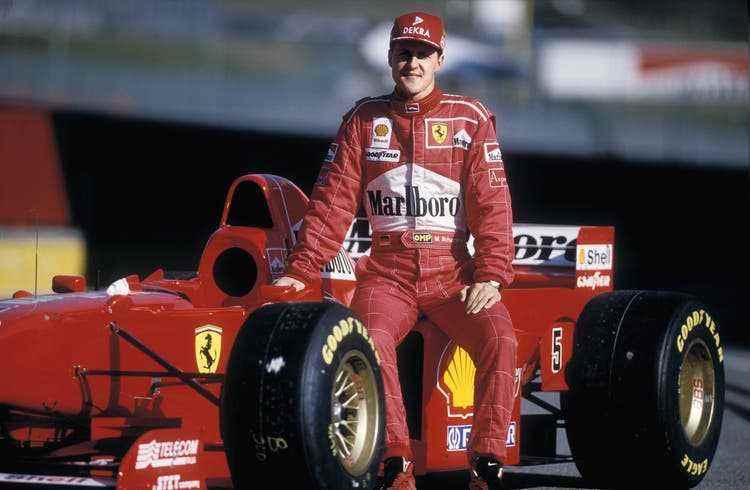The former Formula 1 driver receives the State Prize of the State of North Rhine-Westphalia. The event doesn’t do him justice.
Michael Schumacher during tests at Mugello in 2005.
Motorworld in Cologne is located in the northwest of the metropolis. The name alone reveals what awaits the visitor. The spacious hall houses sales rooms and workshops for all kinds of vehicles, which are as technically complex as they are expensive, which means that the area already looks like a museum that pays homage to an age in which the combustion engine was not considered the devil’s stuff, but a masterpiece of engineering.
This Wednesday, however, automobile fans of a very special category have gathered here. Because it is important to honor someone who is undoubtedly one of the greatest drivers to ever climb into the cockpit of a Formula 1 racing car: Michael Schumacher.
Schumacher can only be compared to Steffi Graf and Boris Becker
Schumacher is awarded the State Prize of North Rhine-Westphalia. The federal state has no higher honor to award. It is carried out by Hendrik Wüst, the Prime Minister. Schumacher’s family came to accept the award on their behalf; Corinna, the wife, and the daughter Gina-Maria. Schumacher himself has not appeared publicly since the serious skiing accident in December 2013. The only official information is that he is in medical rehabilitation.

Michael Schumacher at Imola in 1997 in his second year at Ferrari.
Wüst, the prime minister, didn’t take long to emphasize in his speech the special role Schumacher played not only for motorsport but also for the Germans and above all for the citizens of the federal state of North Rhine-Westphalia. With the exception of the tennis pros Boris Becker and Steffi Graf, Wüst reports, there was no other individual athlete who inspired the masses so much. Schumacher turned Formula 1 in Germany from a “marginal sport for enthusiasts” into a popular spectacle.
Schumacher – that really differentiated him from the somewhat eccentric-seeming Boris Becker – retained that level of down-to-earthness that makes an athlete more than just an idol: namely a real folk hero.
Schumacher’s generosity is praised
Wüst points to the upper level of the sales and workshop hall: it houses a private collection of Michael Schumacher – with the cars in which he drove to his triumphs. “Red! Ferrari red!” says Wüst with an enthusiasm that is unusual for him. The virtual encounter with the champion also seems to evoke special memories in him.
According to the politician, there could be no better place for this honor. Especially since Michael Schumacher grew up not far from here. The fact that the city of Kerpen and Schumacher are not only synonymous in Germany is due to the great success of the driver, who won the Formula 1 title seven times.
Wüst praises the champion’s social commitment, he recalls the “generous donations, mostly in secret”. Rarely did Schumacher make public donations like the $10 million he gave to victims of the 2004 tsunami in the hope that many would follow suit. “Dear Michael Schumacher: We know what you have done for our country, for sport and for people in need,” says Wüst.
As a laudator, however, the father of the country would be too discreet a choice, despite all the factual fidelity that has been read. That’s why Jean Todt came to Cologne, the former Ferrari team boss. Todt recalls the time when he first met Michael Schumacher, back in the 1990s. Schumacher was already a two-time world champion, completely unimpressed by the Ferrari myth.
There are episodes that Wüst can’t help with, details that bring back memories of what a driver Michael Schumacher was. If they didn’t exist, it would be a strangely sterile occasion. Because Jean Todt also reports again what Wüst already mentioned: Schumacher’s generosity is almost proverbial. But Todt also appreciates his friend, who is Schumacher. This friendship grew out of the difficult phase in the first seasons at Ferrari. At that time, according to Todt, they were severely criticized. During this time they had formed a “community of destiny”.
At the end «My Way» is played
It’s a special atmosphere. Because it is important to talk about a man who many assume will never appear in public again. In this respect, the presentation of the State Prize, drastic as it may sound, is more of a commemoration than an honor. Especially since no details are given about Schumacher’s condition. The family has been doing it this way for years, trying to avoid speculation.
It is the paradox of discretion: This also makes a statement that is only reinforced by Hendrik Wüst’s speech: The award winner “could not be here himself for known reasons”. He therefore wished him that he “makes progress on the difficult path. Keep fighting, dear Michael Schumacher!».
Corinna Schumacher, the former racing driver’s wife since 1995, accepts the certificate from the Prime Minister. After an hour the ceremony is over. Before the company disperses, a jazz quartet strikes up Frank Sinatra’s “My Way”, the song that is often played when it comes to making a final decision. Michael Schumacher would wish for something else.
